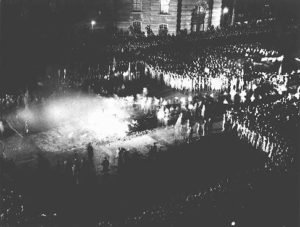Here in Virginia the fight over schools has recently intensified. As in other US states, school board meetings have become battlegrounds over what should be and should not be taught in schools and who should set policies on learning content and on other school policies. According to election analyses, the recently elected new governor of Virginia, Glenn Youngkin won largely because of his embrace of the idea that parents should have more say in what is happening in elementary and secondary public schools. In his election campaign, Youngkin vowed not to allow “critical race theory” to be taught – the idea that institutional racism has been a defining feature of US life since the country’s founding. Interestingly, critical race theory is not actually taught in schools in Virginia (or across the country).
Another issue that has emerged concerns transgender students and how they should be treated in schools, especially regarding which bathrooms they should be using. There is actually a Virginia state law passed recently that requires school districts to accommodate trans students, allowing them to use the restroom that aligns with their gender identity. Despite that, this week a county close to me (Hanover) voted to deny that right to trans students.
Also in Virginia, one more issue that parents have raised is related to books. In some school boards, parents have objected to having some books available to students, those that deal with topics such as sexuality or racism. Youngkin ran an ad featuring a parent objecting to having students read the celebrated novel, “Beloved,” by Toni Morrison, a story dealing with the horrors of slavery. Several school board members in Spotsylvania County have gone further, urging libraries to burn offending books. Destroying books is an attempt to rewrite history, as books are the most important artifacts of human culture and history.
For those familiar with German history, that idea also raises a troublesome occurrence during the early Nazi period, namely in 1934 students in universities across Germany burning what Nazis considered offending books, namely those from authors with different political views (i.e., socialists) or by rejected ethnic groups (i.e., Jews). Among the latter were the works of the prominent poet Heinrich Heine. In one of his dramas, one of Heine’s characters voices a prophetic line: “Dort, wo man Bücher verbrennt, verbrennt man am Ende auch Menschen” [Where they burn books, they will also ultimately burn people]. A reminder that extremist words and actions have real world consequences, which may be horrific.
